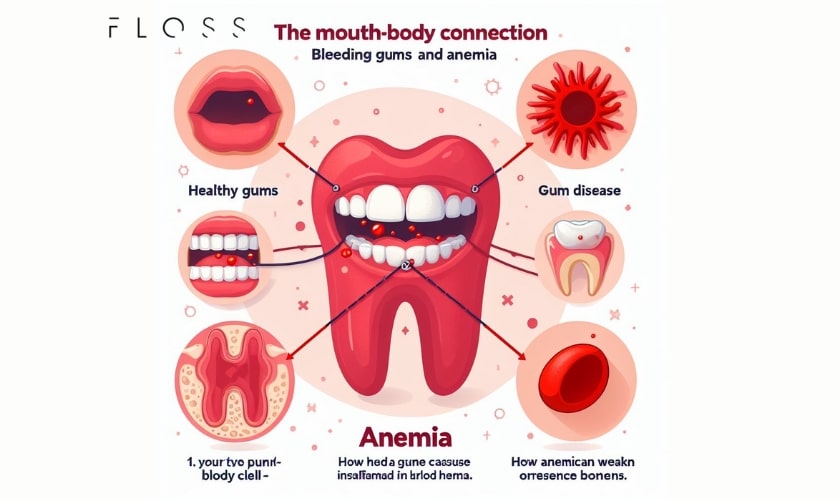Ever noticed a tinge of pink after brushing your teeth? Bleeding gums, while a common occurrence, can be a cause for concern. But can it be linked to something more serious, like anemia? The answer is both yes and no, and it depends on the underlying cause. This blog dives deep into the fascinating connection between oral health and blood disorders, explores the science behind bleeding gums and anemia, and offers valuable insights for maintaining optimal health.
The Anemia: A Quick Overview
Before we connect the dots, let’s understand anemia. Anemia occurs when your body doesn’t produce enough healthy red blood cells, leading to insufficient oxygen delivery. Fatigue, weakness, and shortness of breath are common symptoms. But did you know that anemia can also manifest in your mouth?
Bleeding Gums: The Clue You Shouldn’t Ignore
- Iron Deficiency Anemia and Your Mouth
Iron deficiency—anemia’s notorious accomplice—can wreak havoc on your oral health. When your body lacks iron, it affects red blood cell production, leading to anemia.
- Mouth Symptoms Associated with Iron Deficiency Anemia:
- Sore Tongue: Ever felt your tongue tender and sore? It could be a sign.
- Ulcers in the Corners of the Mouth: Those pesky ulcers might be more than just annoying.
- Altered Taste: Food tasting odd or off? Blame it on anemia.
- Difficulty Swallowing: Anemia can make swallowing uncomfortable.
- Pale Gums: Oxygen-starved gums appear paler than usual.
- The Gum Connection: A 2014 study found a correlation between chronic periodontitis (gum disease) and anemia. Low hemoglobin levels were observed in individuals with gum disease.
- Treatment: Nonsurgical periodontitis treatment may improve anemia, but further research is needed.
- Gum Disease: The Culprit
- Inflammation of the gums triggers a drop in erythropoietin production—a hormone controlling red blood cell production. Result? Anemia in gum disease sufferers.
- Takeaway: Healthy gums are essential for maintaining optimal hemoglobin levels.
Can Bleeding Gums Cause Anemia?
Before we connect the dots, let’s understand anemia. Anemia occurs when your body doesn’t produce enough healthy red blood cells, leading to insufficient oxygen delivery. Fatigue, weakness, and shortness of breath are common symptoms. But did you know that anemia can also manifest in your mouth?
The Potential Link Between Bleeding Gums and Anemia
While bleeding gums themselves don’t directly cause anemia, there are two main scenarios where they might be interconnected:
1. Anemia Can Cause Bleeding Gums:
Certain types of anemia, particularly those related to iron or vitamin B12 deficiency, can weaken the blood vessels and make them more susceptible to bleeding, including in the gums. Iron is a crucial component of hemoglobin, the protein in red blood cells responsible for carrying oxygen throughout the body. When iron levels are low, the body produces fewer red blood cells, leading to a condition called iron deficiency anemia. Symptoms of this condition include:
- Fatigue and weakness
- Pale skin
- Shortness of breath
- Brittle nails
- Swollen tongue
Vitamin B12 deficiency can also contribute to bleeding gums. This vitamin is essential for nerve function and red blood cell production. Deficiencies can arise from dietary restrictions (strict vegetarian or vegan diets), digestive problems, or certain medications. Signs of vitamin B12 deficiency include:
- Numbness or tingling in the hands and feet
- Difficulty maintaining balance
- Weakness
- Depression
- Memory problems
2. Gum Disease May Contribute to Anemia:
Chronic gum disease, particularly periodontitis, can lead to chronic inflammation throughout the body. This systemic inflammation can interfere with the production of red blood cells, potentially contributing to anemia. A study published in the Journal of Periodontology found that patients with severe gum disease had significantly lower red blood cell counts compared to those with healthy gums [1].
Maintaining a Healthy Mouth-Body Connection
The good news is that taking proactive steps towards optimal oral health can significantly reduce your risk of both gum disease and anemia. Here are some key strategies to consider:
- Practice meticulous oral hygiene: Brushing your teeth twice daily for two minutes with a fluoride toothpaste and flossing at least once a day are essential for removing plaque buildup.
- Schedule regular dental checkups and cleanings: Visiting your dentist in Sugar Land for professional cleanings and examinations every six months is crucial for identifying and addressing gum disease early on.
- Maintain a balanced diet: Include iron-rich foods such as lean red meat, poultry, fish, beans, and leafy green vegetables in your diet.
- Consider B12 supplements: If you follow a restricted diet or suspect a B12 deficiency, consult your doctor about taking supplements.
- Manage stress: Chronic stress can exacerbate inflammation throughout the body, including in the gums. Practice relaxation techniques like yoga or meditation to manage stress effectively.
Consult a Dentist in Sugar Land for a Healthy Smile
This blog has explored the connection between bleeding gums and anemia. Remember, a healthy mouth contributes to a healthy body. If you’re concerned about bleeding gums or suspect you might have anemia, schedule an appointment with a dentist in Sugar Land for a comprehensive checkup and personalized guidance. With proper care and preventive measures, you can achieve optimal oral health and prevent potential complications.
